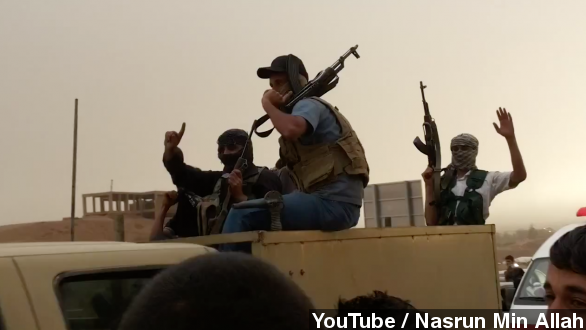As the newly-named Islamic State, formerly ISIS, continues its occupation in Syria and Iraq, more troubling news has been reported — the Iraqi government says insurgents have taken nuclear materials from a university in the northern part of the country.
The seizure happened last month as Islamist insurgents moved through northern Iraq toward Baghdad. A letter sent to the U.N. from the Iraqi government dated July 8 said the militants took nearly 90 lbs of what's believed to be "low-grade" uranium from Mosul University. (Via NBC)
"They were being used for research ... but Iraq's U.N. ambassador warning they could be used to build weapons of mass destruction and could be smuggled out of Iraq to that forest bordered to the west." (Via Fox News)
Several reporters say Iraq's U.N. ambassador is most likely using the letter to drum-up international support to fend off attacks from Islamist militants, but U.N. and U.S. officials have downplayed the threat of those militants actually developing WMDs with the seized materials.
A spokesperson for the U.N.'s International Atomic Energy Agency said in a statement the low-grade nuclear material "would not present a significant safety, security or nuclear proliferation risk."
The militants reportedly got a hold of 88lbs of "low-grade" — possibly not enriched and not as radioactive — uranium. For comparison, the bomb dropped on Hiroshima in 1945 contained 141lbs of enriched uranium. An expert told Discovery in 2011 only 55lbs of highly-enriched uranium would be needed to create a nuclear weapon.
So, the IAEA says the seizure of the nuclear materials isn't a major threat, but added in its statement "any loss of regulatory control over nuclear and other radioactive materials is a cause for concern."
"It illustrates how much of a risk there can be from ISIS as they continue to fight against whole swaths of this country — north of here, west of here — clearly with their eyes still on Baghdad." (Via MSNBC)
This new development comes a day after Iraq confirmed Islamic State militants had taken over a chemical arms complex northwest of Baghdad. The BBC reports there are "2,500 rockets filled with nerve agents - including sarin and mustard gas" at the complex, but U.N. and U.S. officials say those munitions are degraded and the militants won't be able to make chemical weapons. (Via YouTube / Nasrun Min Allah)


